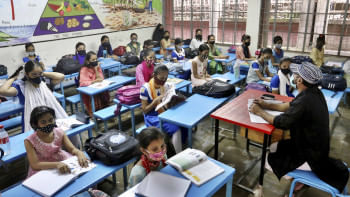Why don't we understand the economic value of education?

As a passionate worker in the sphere of high school education in rural Bangladesh, I have always closely monitored the government expenditure in the education sector. When the budget proposal for the 2023-24 fiscal year was announced, I was alarmed to read the observations of one of our greatest educationists, Dr Manzoor Ahmed. In an article published in The Daily Star on June 2, 2023, he wrote, "The record-high national budget of Tk 761,785 crore has in it the record-low allocation of Tk 88,000 crore for education – which amounts to 11.57 percent of the total budget and 1.76 percent of GDP."
The annual GDP (gross domestic product), in simple terms, is what a country produces in a year within its boundaries. In other words, we can say on education, Bangladesh will spend 1.76 percent of what it earns. By any standard, this is a very small amount spent on such an imperative aspect of society. It is well-known that an increase in government expenditure in education can contribute to economic growth and poverty alleviation, as many studies have proven over the years, such as the study conducted by the International Monetary Fund (IMF) in Tanzania and Zambia.
Why does Bangladesh spend so little on education? Spending only 1.76 percent of GDP for the education sector, the country has ranked at a woeful 184th position (as of 2021) among all nations, according to The World Factbook. The answer to this question cannot be simplified into one factor; there may be many reasons. One important reason, I believe, is that Bangladesh, as a nation, does not even know the economic value of education. We seem to lack the basic knowledge that if a country spends more on education, one would get growth and less poverty. The basis of this hypothesis is reflected in the alarming scarcity of economic studies assessing the importance of education in Bangladesh.
In order to reverse the backsliding and dwindling importance of learning in our society, an economic approach to education must be promoted and prioritised. Specifically, the country should study what the impact of investing, say, Tk 100 crore in the education sector would reflect on the supply of skilled manpower, productivity of the country through utilisation of skilled manpower, the growth rate, and equity. We don't need to perform ostentatious econometric studies for that. A relatively simple and easily understandable "cost-benefit analysis" would serve the purpose.
Some people may argue that Bangladesh is capable of achieving a high economic growth rate despite low education expenditures. High growth rates can come about due to a number of factors, and taking that perspective into account, why don't we ever realise that our country would have witnessed even higher growth rates if we spent more on education?
This pervasive, ignorant position regarding the economic value of education has cost the nation other losses too: Bangladesh has not been successful in transforming a large percentage of the youth population into productive human resources – half of Bangladesh's demographic dividend period has passed. As one can expect the population to get larger, in the lower-income segment of the population, taking advantage of the dividend will impact this segment more favourably. This also means we are missing out on an opportunity to reduce income inequality as well.
In order to reverse the backsliding and dwindling importance of learning in our society, an economic approach to education must be promoted and prioritised. Specifically, the country should study what the impact of investing, say, Tk 100 crore in the education sector would reflect on the supply of skilled manpower, productivity of the country through utilisation of skilled manpower, the growth rate, and equity. We don't need to perform ostentatious econometric studies for that. A relatively simple and easily understandable "cost-benefit analysis" would serve the purpose.
Furthermore, there needs to be more advocacy towards an economic approach to spending in any area of the education field. As an example, in a previous article published in The Daily Star, we raised the issue of having English-medium education parallel to the Bangla-medium one.
The allocation of resources within the education sector, such as allocation to mother tongue Bangla and to STEM subjects, relative to English, were brought up in the article. All these issues can be addressed from the economic perspective. Broader issues such as allocation of resources to general education relative to vocational education is a major matter of choice. One can think of concrete issues such as the government establishing another university, engineering college or medical college, etc.
Moving from the national scene to the choices made by individual families, it is interesting to observe that an implicit economic analysis takes place each time decisions are made at the family level on children's education. For example, one can perform a cost-benefit analysis behind a rural father's decision to sell crop-producing land to afford higher studies for his son. In my view, these individual-level decision-making practices, which have implicit economic analyses behind them, can be refined formalistically to analyse the bigger picture. For example, a strict, economic cost-benefit analysis of a daughter's higher education should be the same as a son's. A female doctor's medical school costs are not different from that of a male doctor. On the other end, a female doctor's income should be the same as a male doctor. Thus, a formalistic economic analysis of a son or daughter's higher education would result in an outcome where either the daughter or the son can go to medical school.
The advantage an economic analysis gives is that there is no room for "extra-economic" factors. To name a few, biases related to distinction between male and female, urban and rural, religious and communal, elite and commoner class, high income and low income – all these involve extra-economic factors. Outcomes freed of extra-economic biases are invariably higher-value, not to speak of higher equity-producing. Importantly, the field of education is fraught with extra-economic factors, particularly in developing and emerging economies, such as socio-economic "fads," vacuous "prestige" issues, perception of "social class climbing," English-medium Bangla-medium, domestic-foreign degrees, etc.
The education sector in Bangladesh is a vital sector, for individuals as well as for society as a whole. Yet, a rational and analytical approach is sorely missing in Bangladesh. From national spending on education to a rural underprivileged family's decision on children's education – decision-making on education is "infested" with perceived, often irrational, factors at all levels. The nation, collectively and individual citizen-wise, is deprived of vital income and growth because of that.
Matilal Pal is an economist who devoted himself, for the past 20 years, to education for the underprivileged in Bangladesh, as a former official of the Volunteers Association for Bangladesh (VAB).


 For all latest news, follow The Daily Star's Google News channel.
For all latest news, follow The Daily Star's Google News channel. 









Comments